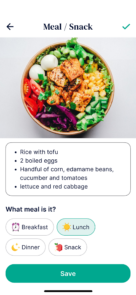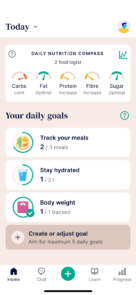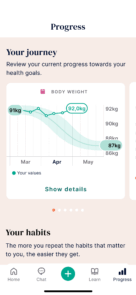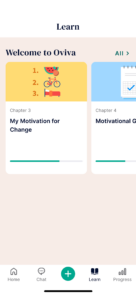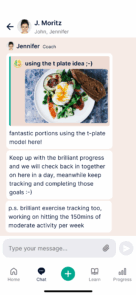
13 weight loss tips to lose weight and keep it off
Losing weight can feel challenging, but successful, long-term weight loss is possible. Many people struggle to find a method that works long-term, but the key isn’t extreme dieting—it’s small, lasting lifestyle changes.
At Oviva, we specialise in helping people lose weight in a healthy, sustainable way. Our team of doctors, dietitians, health coaches, and psychologists provides expert support to help you make changes that fit your life.
Discover 13 expert-backed tips to help you lose weight effectively and keep it off—without fad diets or unrealistic restrictions.
Take our survey to see if you’re eligible
Key Takeaways
- Focus on long-term habits, not quick fixes – Extreme diets often lead to weight regain. Instead, make small, lasting changes to your eating and exercise routines.
- Set clear, achievable goals – Tracking your weight, food intake, and activity levels helps you stay on course. Using an app can make this easier.
- Make simple, healthy swaps – Choosing whole grains over refined carbs, drinking water instead of sugary drinks, and eating protein-rich meals can support long-term weight loss.
- Seek professional support when needed – A structured weight management program, like Oviva, can provide expert guidance from dietitians, psychologists, and health coaches.
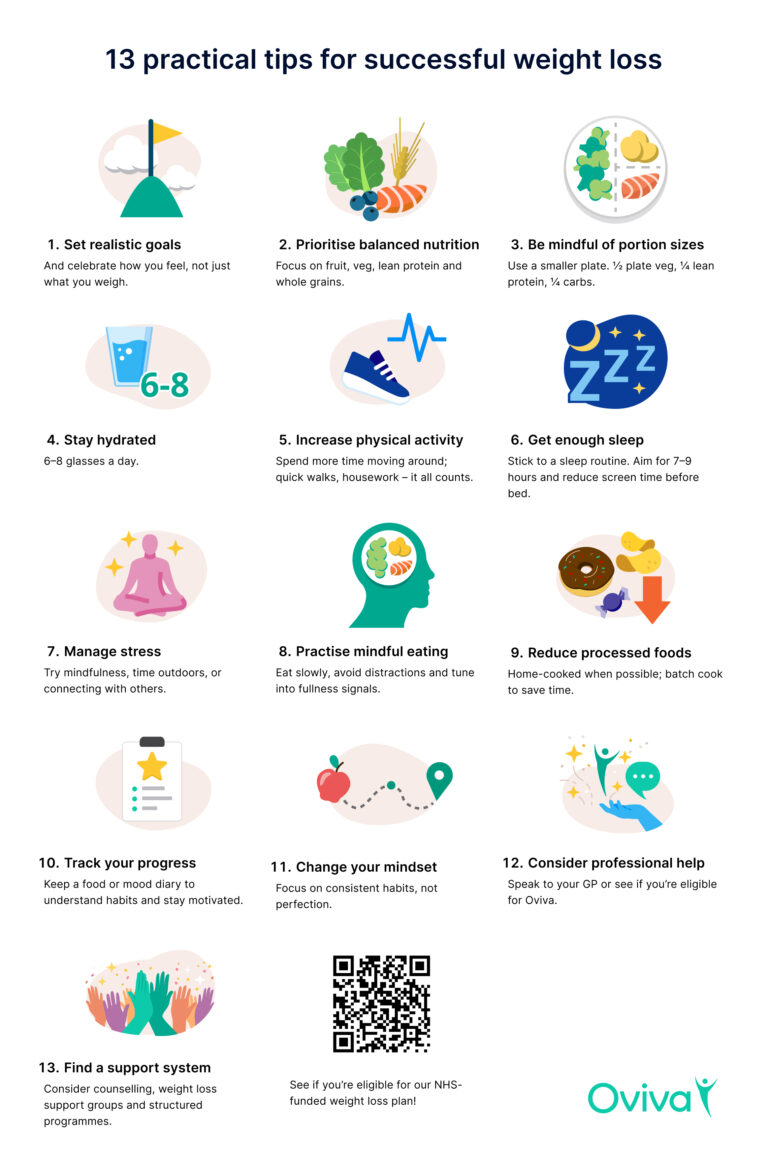
How much weight should you lose?
The best way to determine your long-term weight loss goal is to aim to lose 5 to 10% of your total body weight. This kind of weight loss has been linked with significant health benefits.
According to the NHS, the healthy range for most people is a BMI between 18.5 and 24.9.
It’s important to focus on healthy weight loss, rather than trying to find quick fixes. Aim for a sustainable weight loss journey where you lose around 0.5 to 1 kg per week, on average.
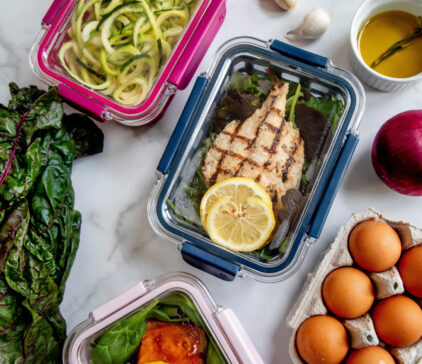
13 weight loss tips that you can stick to
If you’re wondering how to lose weight and keep it off, our helpful weight loss tips are dietitian approved and are based on realistic habit changes that you can stick to. Check them out below!
1. Set realistic goals
Setting realistic and achievable goals is an important first step to reduce weight – a good place to start is a target weight and a goal for the speed of your weight loss.
Realistic is the key word here – if you set an unrealistic weight loss in a short time frame, you may become overwhelmed or disheartened.
The NHS recommends a sensible weight loss goal of around 0.5 to 1 kg (1 to 2 lbs) per week, aiming for 5 to 10% body weight loss to achieve health benefits.
Tip: Build a list of non-food related rewards that you can use to celebrate as you reach your goals. Your goals may include the way you feel, and not just a number on the scales!
As you progress through your weight loss journey, you can use these initial goals as a guide. If you fall short of a weekly or monthly weight loss target, remind yourself that’s OK and think about where you can make small adjustments to your eating and levels of activity to ensure you reach your goal next time.
Tracking your weight loss in an app can help as you not only monitor your weight loss journey week to week, but also see the longer-term results. If you’re eligible for the Oviva programme and gain a referral from your doctor, you can use our app for this.
2. Prioritise balanced nutrition
Effective weight loss requires a focus on nutrition and a balanced diet for long term health. Fruit, vegetables, lean proteins and whole grains are all important and you should spread your meals out throughout the day. Don’t feel tempted to skip breakfast or lunch to reduce calories.
Reading your food labels is a great place to start – it can help you become aware of the hidden ingredients in food. The traffic light labelling system on food packaging will tell you at a glance if the food has high, medium or low amounts of these nutrients (depending on the colour coding). You should aim for mostly green and amber per portion size.
| High | Low | |
| Sugar | Over 22.5g/100g | Under 5g/100g |
| Fats | Over 17.5g/100g | Under 3g/100g |
| Saturated fat | Over 5g/100g | Under 1.5/100g |
| Salt | Over 1.5g/100g | Under 0.3g/100g |
Our 7-day healthy meal plan can help you get started – these meals prioritise protein and fibre to help with feeling full as well as overall health.
3. Be mindful of portion sizes
Using a smaller plate can help. Aim to keep your carbohydrate portion (rice, pasta, potatoes) to a quarter of the plate, lean protein (fish, meat, soya or tofu) to a quarter, and then the final half for vegetables or salad.
4. Stay hydrated
The UK’s healthy eating model, the Eatwell Guide, recommends 6-8 glasses of water every day, or around 1.2 litres per day.. While this includes tea, coffee, sugar-free drinks and low-fat milk, water is the best option when trying to lose weight because it’s calorie-free.
We recommend carrying a water bottle around with you and setting reminders on your phone to ensure you’re drinking enough. Even mild dehydration can affect concentration and energy levels. If you struggle to drink water, consider sparkling water or adding a few drops of lemon juice.
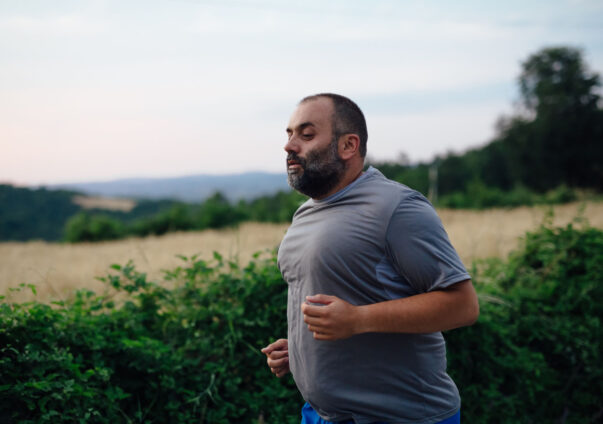
5. Increase physical activity
Alongside any adjustments to your diet, it’s important to change your activity levels. Start slow and aim to increase the intensity and duration of exercise over time.
To begin with, this could be as simple as spending less time sitting and more time moving around, both at work and at home. Going for regular walks is another good starting point, and you might consider other forms of aerobic exercise, including swimming and cycling, as you increase the intensity.
NHS guidelines state that adults should aim for at least 150 minutes of moderate intensity exercise, or 75 minutes of vigorous activity, each week.
Walking, riding a bike and pushing a lawn mower all count as moderate exercise. Running, swimming and playing high-intensity sports like football all count as vigorous exercise.
6. Get enough sleep
Sleep plays a key role in weight loss efforts. Getting too little sleep can negatively impact your metabolism, while lack of sleep can also lead to poor dietary decision-making.
Try to stick to a regular sleep schedule and aim for around 7 to 9 hours of sleep as often as you can. Create a relaxing bedtime routine and try to avoid using your phone immediately before bedtime. If you struggle to sleep, set aside half an hour beforehand to read a book and relax.
7. Manage stress
One of the best weight loss tips is to minimise stress. After all, stress is associated with comfort eating and can also impact fat storage in the body.
You can take proactive steps to reduce stress, like exercising more, eating well and looking into what mindfulness habits work for you. For some people, that’s meditation, for others, it’s time outside, while for some, it’s quality time with loved ones.
What makes you feel relaxed? Try spending five minutes writing down all the things you can think of. If you’re not sure, why not start by trying a few different things and seeing which you enjoy?
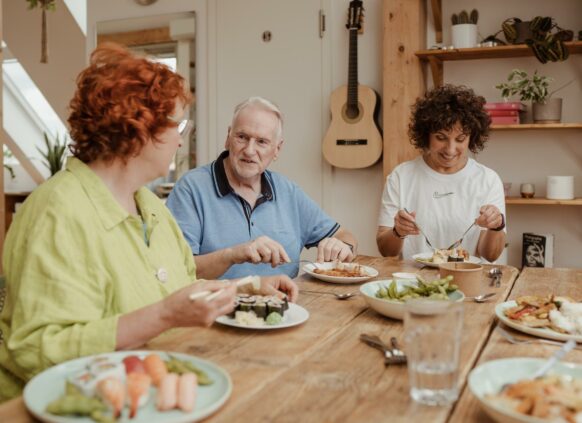
8. Practise mindful eating
Mindful eating is the idea of being fully attentive to the food you’re eating and your feelings of hunger and fullness. It can form a crucial part of an easy weight loss strategy because it helps you avoid unconscious eating, overeating, or eating out of habit.
Sit down with your food and try to appreciate every bite. Eat slowly and avoid distractions like the television. Pay close attention to your body and stop eating when you start to feel full.
9. Limit sugary and processed foods
These foods often contain high levels of saturated fat, salt and sugar. So, one tip if you’re looking for the best diet for weight loss limiting sugary, processed and ultra-processed foods can help you to eliminate foods in your diet with high calorie content and poor nutritional value.
A simple way to think about ultra-processed foods is foods that contain multiple ingredients you’re unlikely to find in a kitchen. Ice cream, sausages and crisps are all good examples.
Some simple ways to do this are:
- Choosing sparkling water or zero-sugar soft drinks over sugary drinks.
- Preparing as many meals as possible from scratch, using simple, nutritious ingredients.If you feel restricted on time, try batch cooking and choose recipes that only use a few ingredients and take under 30 minutes.
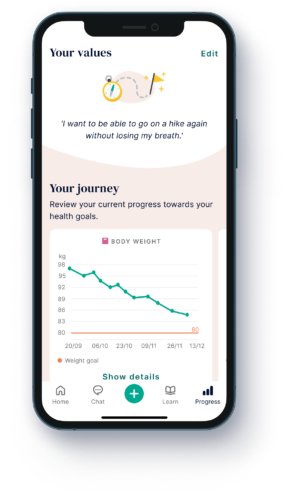
10. Track your progress
Keeping a food diary makes it twice as likely you’ll reach your weight loss goals. This is because in order to change our habits for weight loss, we need to pay attention to what we are doing, when and why we are doing them and be able to link them to their immediate and long-term effects.
If you’re eligible to join the Oviva programme, our app makes self-tracking much easier, allowing you to keep a food and exercise diary, while tracking your weight over time.
You can also use the app to track your mood, blood pressure, blood glucose, water intake and more. You’ll benefit from monitoring and feedback from Oviva coaches and we also use AI technology to provide instant feedback on your food logs.
11. Change your mindset
Your mindset can make a huge difference to weight loss results. For instance, rather than focusing on easy weight loss, try to focus on sustainable behavioural changes.
It’s important to focus your mindset on consistency, rather than perfection. Steer clear of “all or nothing” thinking and try to embrace the idea of small changes you can stick to.
It can also be a good idea to visualise your future self, as this can provide extra motivation.
Start by identifying why weight loss is truly important to you. Be specific. For example, instead of saying ‘I want to lose weight to be healthier,’ say ‘I want to lose weight to reduce my risk of diabetes and feel more energised to play with my kids.’ By anchoring your goals in personal values, you’ll create a powerful motivation.
Imagine how your life will be different once you reach your weight loss goals,. Picture yourself confidently running a 5K or feeling comfortable in your clothes. This vivid image can serve as a guiding light, making the hard work feel more worthwhile.
Vicky Lawson, Clinical Lead for Psychology at Oviva
12. Consider professional help
If you’re living with obesity and have other health conditions, like asthma, type 2 diabetes, depression or sleep apnoea, or if you have a BMI over 40, you may want to consider asking for professional help. The best way to start this process is to speak to your doctor.
For most people, obesity is defined as a body mass index (BMI) over 35. You can calculate your BMI for free with our simple calculator.
There are a variety of treatment options available, including weight management support programmes and prescription weight loss medications, like Wegovy and Saxenda.
Support from a weight management service like Oviva may be worth considering if you’ve struggled to lose weight using other methods, such as calorie counting, increasing exercise, or adhering to a programme like Weight Watchers. It’s also a great option if you’re worried about diabetes, cardiovascular disease, or heart health more generally.

13. Find a support system
Learning how to lose weight effectively is tougher if you’re on your own. Try to find a support system that can help you on your weight loss journey.
Counselling, weight loss support groups and structured programmes are all possible options.
Not only can a support system help you to stay motivated, it may also help you to understand the underlying causes of weight gain and some of your behaviours. This can then make it easier to address these issues at the root and make lasting changes to your eating and exercise habits.
Losing weight fast: debunking the myths
- Ambitious weight loss targets can be daunting, so it’s better to break your long-term target down into manageable short-term goals. The NHS recommends a sensible weight loss goal of around 0.5 to 1 kg (1 to 2 lbs) per week.
- Without the right level of support, very low calorie diets can be difficult to sustain and often lead to a situation where you regain weight. At Oviva, we do support people on very low calorie diets as one of the options for losing weight and we know seeing great results quickly can be motivating. However, crucially, we provide expert support and guidance over 12 months, so you learn the best way to lose weight and also how to keep it off.
- Quick fixes are not the answer when it comes to sustainable weight loss. The goal for long-term weight loss and management should be lasting behavioural changes. This includes choosing healthier food options and getting more exercise.
- Huge overnight changes to your eating habits are often harder to maintain than sensible adjustments. For example, rather than eliminating bread from your diet completely, try switching from white bread to whole wheat bread. If you enjoy jam on toast for breakfast, try mashed banana on toast instead. Switch from sugary drinks to sparkling water or, when necessary, zero-sugar soft drinks.

How Oviva can help you lose weight successfully
The weight loss tips provided offer helpful insights into how to not only lose weight, but maintain that weight loss and reach your long-term goals.
If you’re looking for help with weight loss and meet the eligibility criteria, Oviva can help you. All of the tips provided form part of our weight management service. You’ll receive coaching, an app to track nutrition and exercise, and weight loss medication, when appropriate.
And the availability effective weight loss injections, like Wegovy, offers the potential for even better results for patients who join today.




